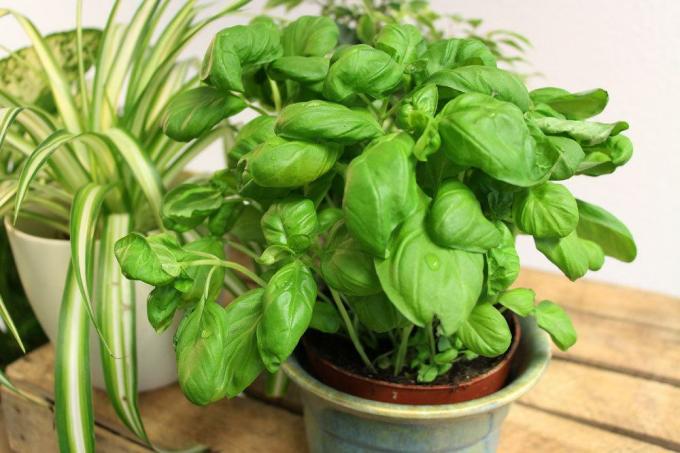
table of contents
- Heavy Eater - Basil
- Substrate for pot culture
- Fertilize the soil continuously
- Further quality features of the earth
- Cultivation soil for sowing
The pretty blooming one basil is one of the herbs thanks to its flavor. Therefore, it is automatically assumed that basil requires nutrient-poor soil. But will its roots find necessary nutrients in it? Hardly likely.
In a nutshell
- As a heavy eater, basil needs a lot of nutrients, lean herb soil is unsuitable
- a continuously loose, permeable soil with a lot of nutrients is ideal
- Enrich the soil with compost and fertilize regularly with organic fertilizers, loosening up with sand and perlite if necessary
- In the pot, compost-based potting soil and regular topping up with organic liquid fertilizer are recommended
- only for sowing basil seeds is nutrient-poor potting soil better suited
Heavy Eater - Basil
Unlike other types of herbs that thrive better in very poor soil, basil, scientifically Ocimum basilicum, needs a lot of nutrients. So many that it belongs to the group of so-called heavy eaters. It is happy about a nutrient-rich and humus-rich soil from the start. After the end of the previous year, however, the garden beds are more or less depleted. That is why the soil must be improved with ripe compost before planting in May, preferably a month beforehand.
Tip: Before planting, loosen the soil and remove all weeds so that they do not snatch nutrients away from the herb later.

Substrate for pot culture
In the pot, the royal herb, as this plant is also called, is best rooted in compost-based potting soil. If you have bought a herb pot in stores, the potting soil is usually quite depleted. Repot basil in nutrient-rich soil soon. Make sure that no more than 5-10 shoots grow per pot. If necessary, divide the contents into two or more pots.
Fertilize the soil continuously
A starter fertilization, as rich as it is, is never enough to meet the requirements of this herb for the entire growing season. Since the necessary nutrients must not be missing from sowing to flowering, fertilization must be continued on an ongoing basis.
- fertilize in the bed from May to September
- weekly with compost
- alternatively with horn shavings
- granulated cattle manure is also optimal (if necessary Additionally)
- Do not fertilize in the pot 4-6 weeks after planting
- then fertilize weekly
- with an organic liquid fertilizer
- Do not use artificial fertilizers in the bed or pot
Tip: The basil herb is also happy to have a thin layer of coffee grounds. This natural fertilizer provides nitrogen and keeps snails away. It should be free of charge in almost every household.

Further quality features of the earth
The soil for basil must be loose and permeable to prevent waterlogging. If it does not have this quality, it must be structured before planting or planting. be optimized with sand or perlite prior to direct sowing. Then rainwater and too much irrigation water can drain away more quickly. The ideal pH for this herb is 6.5 to 7.5.
Cultivation soil for sowing
Only for the sowing one can and should make an exception. The royal herb germinates reliably in nutrient-poor potting soil and remains healthy. But as soon as the plants have formed a few pairs of leaves, they must receive the necessary nutrients. Then basil can either be planted in the garden or has to be given a new pot and new soil.
No. Herbal soil is a special mixture with few nutrients. It is ideal for herbs that require a lean substrate. This vigorous herb would wither in it.
Yes. However, you should give this herb a spot at the top, or at least in the middle of the spiral, so it gets enough sun and no wet roots. You must not forget to use nutrient-rich substrate in its place and then to fertilize it regularly and in a targeted manner.
The basil herb is usually not planted as a pure flower, but as a culinary herb. Since we eat its leaves, they should be of organic quality. This includes that the herb grows in a substrate that is only supplied with a natural fertilizer.



